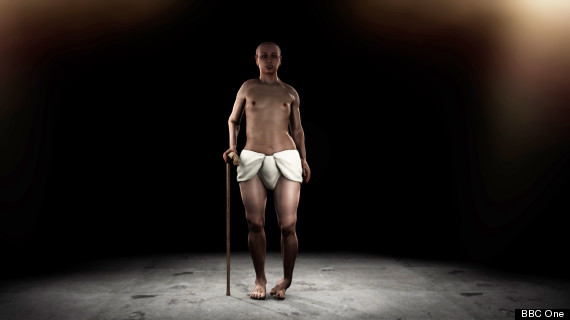An international team of researchers studying King Tutankhamun are
reporting some surprising new discoveries about the ancient boy king.
The
scientists say that a 'virtual autopsy' of Tut -- essentially a close
analysis of a life-size image of the king made from more than 2,000 CT
scans of his mummified remains -- shows that he had buck teeth and a
club foot as well as a girlish figure.
The findings, featured in a new BBC One documentary entitled "Tutankhamun: The Truth Uncovered," suggest a new explanation for King Tut's mysterious death.
(Story continues below images.)
A digital depiction of King Tut, showing his feminine appearance.

A digital depiction of King Tut, showing his severe overbite.
Gayle Gibson,
an Egyptologist who teaches at the Royal Ontario Museum and a
contributor to the documentary, told The Huffington Post that the new
findings cast doubt on a popular theory that the young pharaoh rode in
chariots and died in a crash.
Tut's foot deformity would have made it likely that he walked with a
limp and used a cane. That would have made it unlikely that he rode in
chariots.
Another contributor to the BBC One documentary agreed with that assessment.
"The
evaluation of the CT scans clearly points out that it is highly
unlikely that he was riding a chariot due to his foot disease and his
general bad health," Dr. Albert Zink of the Institute for Mummies and
the Iceman in Bolzano, Italy, told HuffPost. "Therefore it is unlikely
that he had an accident while riding the chariot. [His remains show] a
fracture at the left knee that didn't show any signs of healing, but
this could be the result of a simple fall and is not typical for a 'car'
crash."
The new research also included a genetic analysis of Tut's remains. It confirmed previous research suggesting that Tut's parents were probably brother and sister -- a pairing that could have contributed to his anatomy and explained the knee injury.

 "Some
of [Tut's male ancestors] suffered from feminizing features of enlarged
breasts and wide hips, according to artistic and sculptural sources,
whilst some of his ancestors may also have suffered from likely
neurological symptoms," Hutan Ashrafian,
a clinical lecturer in the Department of Surgery & Cancer at the
Imperial College London, told HuffPost. "These point to the possibility
of an inherited cause of death that may have led to a hormonal imbalance
resulting in these feminized features, but also an increased likelihood
of fractures derived from nascent disease."
"Some
of [Tut's male ancestors] suffered from feminizing features of enlarged
breasts and wide hips, according to artistic and sculptural sources,
whilst some of his ancestors may also have suffered from likely
neurological symptoms," Hutan Ashrafian,
a clinical lecturer in the Department of Surgery & Cancer at the
Imperial College London, told HuffPost. "These point to the possibility
of an inherited cause of death that may have led to a hormonal imbalance
resulting in these feminized features, but also an increased likelihood
of fractures derived from nascent disease."
Tutankhamun was born in 1341 B.C. and assumed the throne at the age of 9 or 10. He is believed to have died around the age of 19.
"Tutankhamun: The Truth Uncovered" airs on BBC One on Sunday, Oct. 26.



No comments:
Post a Comment